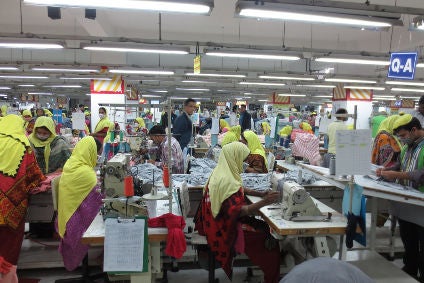
The German government has agreed to new legislation that will force companies to comply with social and environmental rules along their global supply chains.
Although the draft text of the law has not been published yet, ministers announced details at a press conference last week (12 February). The legislation is expected to be passed before the elections in autumn 2021, and to come into force at the beginning of 2023.

Discover B2B Marketing That Performs
Combine business intelligence and editorial excellence to reach engaged professionals across 36 leading media platforms.
German unions have argued for years that a law on due diligence in supply chains – Sorgfaltspflichten – is necessary.
The new law will incorporate the provisions of the UN Guiding Principles for Business and Human Rights and the OECD Guidelines for Multinational Enterprises into German domestic legislation.
It will place legal obligations on companies headquartered in Germany to ensure that human rights and related environmental standards are observed at all levels of the supply chain. It will initially cover companies with more than 3,000 employees, and from 2024 will be extended to companies with more than 1,000 workers.
Subcontractors in other countries will have to comply with the same standards, although indirect suppliers will only be examined if issues are raised.

US Tariffs are shifting - will you react or anticipate?
Don’t let policy changes catch you off guard. Stay proactive with real-time data and expert analysis.
By GlobalDataThis would make German companies liable for abuses that occur in their supply chains. If they fail to remedy these abuses, trade unions and NGOs would be able to take companies to court in Germany on behalf of the victims.
“The supply chain law needs to strengthen local freedom of association and take action against union busting. We need strong trade unions in the countries along the supply chains,” said Wolfgang Lemb, member of the executive committee of IndustriAll affiliate IG Metall.
Companies will be able to limit their liability if they implement a government-approved industry standard, called a Safe Harbour.
German unions argue that a minimum requirement of Safe Harbour status would be that the company sign a Global Framework Agreement (GFA) with the relevant global union. This would provide another mechanism for resolving complaints – as well as negative consequences for companies who violate the terms of GFAs.
Due diligence legislation
The move comes amid a growing global tendency towards due diligence legislation.
In 2017, France became the first country to introduce a national law based on the UN guiding principles. The Netherlands adopted a law on child labour in 2019, and the United Kingdom has a Modern Slavery Act.
Laws have also been passed in the United States and Switzerland, and are in preparation in Hong Kong and Canada. IndustriAll global union’s sister organisation, IndustriAll Europe, is calling for due diligence rules at the EU level.
Unions in Germany have consistently made the case for a similar law, joining forces with more than 120 member organisations in the Initiative Lieferkettengesetz, and working hard to campaign and lobby for the law.
They built political support over the years by highlighting the failures of a voluntary approach, and the law has been endorsed by prominent economists. Some companies, including Tchibo, which has a GFA with IndustriAll, also support the law.
Most multinational corporations claim that due diligence legislation is not necessary, and that they can police their own operations through voluntary codes of conduct. However, unions have shown that this is not true. They have demonstrated repeatedly that companies fail to abide by voluntary codes when it is not in their economic interest.
Germany is governed by a grand coalition made up of the centre-right CDU/CSU and the centre-left SPD. The SPD has consistently supported the law, but even conservative politicians are coming on board.
The CSU minister in charge of the BMZ, the German ministry for economic cooperation and development, which is responsible for overseas aid and development, joined the SPD labour minister in a call for the legislation.





